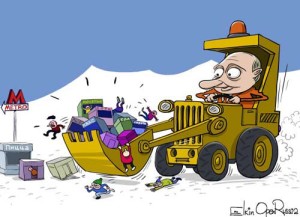
During a recent meeting on the improvement of the government procurement system, Prime Minister Medvedev declared that it was imperative to involve small and medium-size businesses in this process. One month later, the Ministry of Economic Development came up with draft legislative amendments that are supposed to facilitate the conditions for participation in the process of government procurement for small-size enterprises by dispensing them from the required provision of collateral. It is as yet unclear whether this measure will be effective, since specialists already point to the insufficient and inaccurate character of the proposed changes.
Concern for small and medium-size businesses is one of the favorite topics for both Medvedev and Putin. However, despite the annoyingly regular promises of support, small companies continue to experience difficulties.
The share of small and medium-size enterprises in the country’s GDP is a key indicator of Russia’s economic health. According to official estimates, in Russia it amounts to 20 percent. According to entrepreneurs themselves, however, it only reaches 3 percent. In comparison, in the United States, the share of small businesses in the country’s GDP amounts to around 60 percent, and in some European countries it reaches 80 percent.
In 2014, more than half of all small enterprises recorded a decrease in financial stability, and more than half of entrepreneurs declared that business conditions had deteriorated. Over the past year the tendency has not changed, and by 2016 more than 21 percent of small and medium-size businesses were in either a bad or a very bad financial situation. As of May 2015 (more recent figures are not yet available) the return on investments’ period in small businesses has grown from 1 – 1.8 years in 2013 to 4 – 9.4 years.
The government claims that the tax burden on small and medium-size businesses will not be raised, and declares tax holidays. In reality, however, all kinds of dues that rob entrepreneurs of any leftover profits appear like mushrooms after the rain: a sales tax is being introduced; the cadastral value of real estate is being increased, which leads to an increase in the property tax; the Platon road tax system has been launched.
Meanwhile, access to financial resources has decreased. According to the Russian Central Bank, the volume of loans to small and medium-size businesses that has been decreasing since 2014 dropped by 35 percent over two years.
All the aforementioned facts indicate that the situation of private entrepreneurs has considerably deteriorated, which can only result in business closures. In response, government statistics bodies began actively embellishing reality by misrepresenting the actual number of small and medium-size businesses.
Moving beyond the achieved “progress,” the Federal State Statistics Service announced that a “continuous statistical monitoring of the activity of every small and medium-size business entity” would be carried out in 2016.
According to RBC, revenues of Russia’s 500 major companies account for 80 percent of the country’s GDP. Gazprom, Rosneft, Surgutneftegas, Lukoil, Russian Railways, and major state-controlled banks Sberbank and VTB are at the top of the list. It is worth noting that, according to VTB CEO Andrei Kostin’s statement in October 2015, “there is no demand for small and medium business in the land, there’s no space for it”.
 The aforementioned statement very adequately demonstrates the Putin regime’s actual attitude toward the owners of small and medium-size businesses. Kremlin would prefer that they ceased to exist altogether. The regime is based on the country’s 500 major companies, the majority of which, if one considers production levels, are either directly controlled by the state or owned by oligarchs who are openly and unquestionably loyal to Putin. The owners of small-size enterprises, who are concerned about corrupt officials, courts and police, and who are unwilling to give at least half of their earnings to the government, do not fit into the present Russian reality. Consequently, when Moscow Mayor Sobyanin in one night demolish hundreds of square meters of small retail businesses, their owners, instead of being reimbursed for their losses, can easily end up in jail on state banks’ accusations of committing fraud by getting loans they have not intended to repay. Entrepreneurs who yet have not been incarcerated by the regime’s repressive machine, are selling off their businesses and leaving the country. Such behavior is understandable — businessmen will not go to barricades, while they still have something to loose.
The aforementioned statement very adequately demonstrates the Putin regime’s actual attitude toward the owners of small and medium-size businesses. Kremlin would prefer that they ceased to exist altogether. The regime is based on the country’s 500 major companies, the majority of which, if one considers production levels, are either directly controlled by the state or owned by oligarchs who are openly and unquestionably loyal to Putin. The owners of small-size enterprises, who are concerned about corrupt officials, courts and police, and who are unwilling to give at least half of their earnings to the government, do not fit into the present Russian reality. Consequently, when Moscow Mayor Sobyanin in one night demolish hundreds of square meters of small retail businesses, their owners, instead of being reimbursed for their losses, can easily end up in jail on state banks’ accusations of committing fraud by getting loans they have not intended to repay. Entrepreneurs who yet have not been incarcerated by the regime’s repressive machine, are selling off their businesses and leaving the country. Such behavior is understandable — businessmen will not go to barricades, while they still have something to loose.





